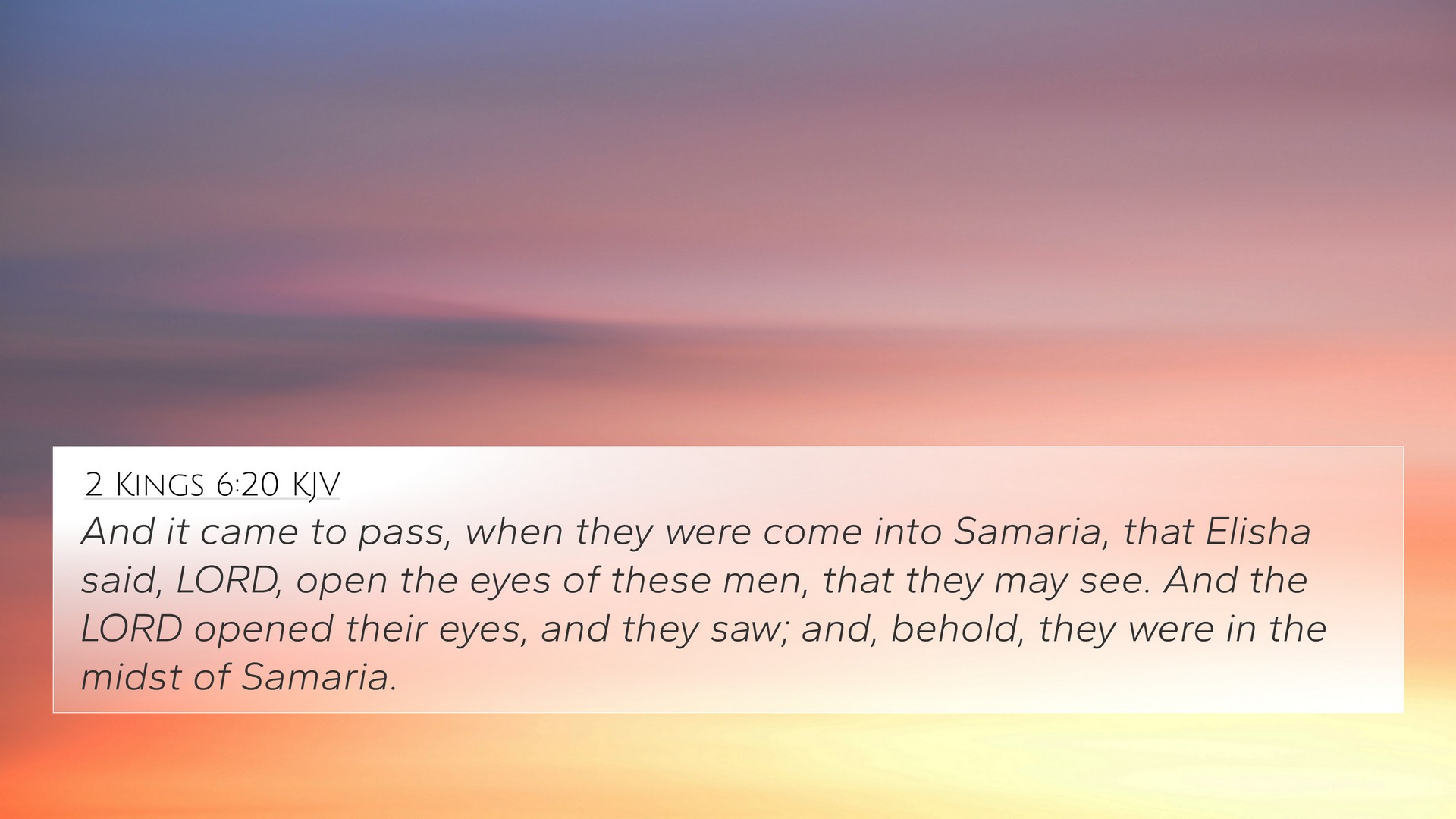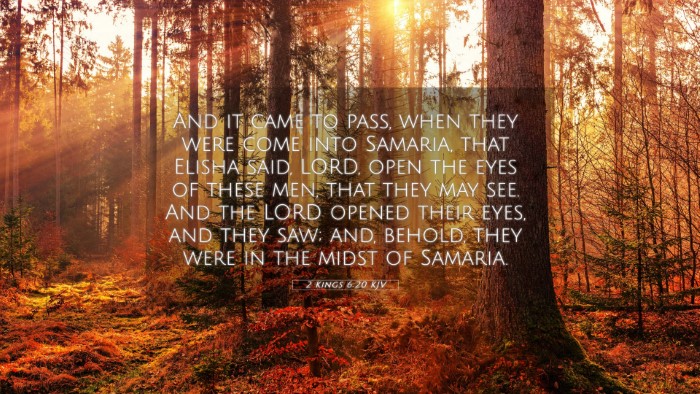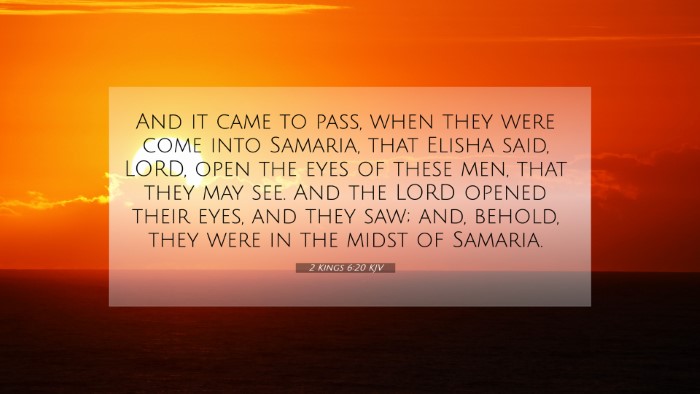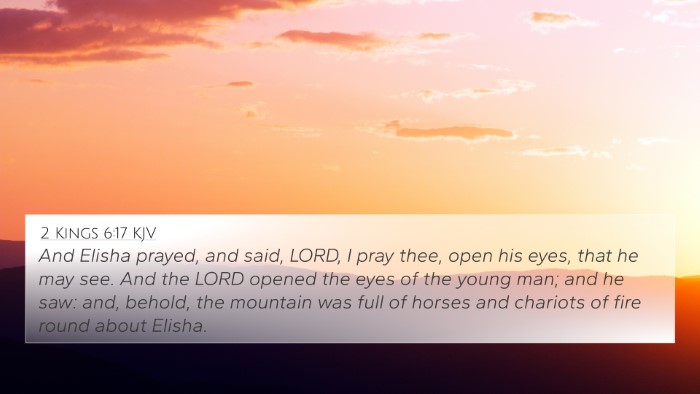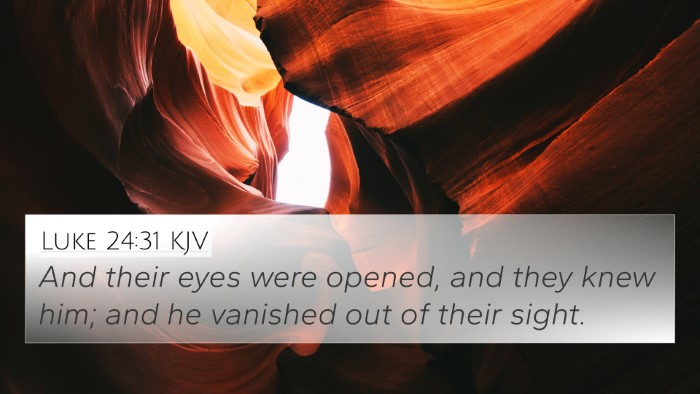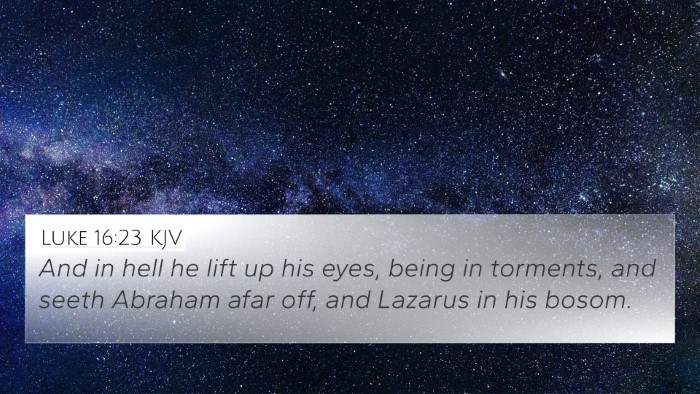Understanding 2 Kings 6:20
Verse: "And it came to pass, when they were come into Samaria, that Elisha said, Lord, open the eyes of these men, that they may see. And the Lord opened their eyes, and they saw; and, behold, they were in the midst of Samaria."
Summary of Meaning
This verse encapsulates a pivotal moment where Elisha, the prophet, exemplifies the power of divine revelation. The context presents a scenario where a group of Aramean soldiers is struck blind by God, only to be later led into the very heart of Israel, Samaria. Elisha's prayer for the soldiers’ eyes to be opened serves as a profound lesson on the awareness and understanding of God's presence and purpose.
Thematic Insights
- Divine Intervention: The event showcases God's sovereignty over human affairs. Elisha acts as an intermediary, highlighting how God intervenes in moments of conflict.
- Spiritual Awareness: The opening of the soldiers' eyes symbolizes spiritual enlightenment. This profound insight reflects the essence of understanding God's truth, which is crucial for spiritual growth.
- Compassion over Revenge: Elisha's actions demonstrate a preference for mercy over vengeance, aligning with the broader Biblical theme of forgiveness and love towards enemies.
Commentary Insights
The following insights are derived from prominent public domain commentaries:
-
Matthew Henry:
Henry emphasizes the miraculous nature of Elisha's actions, highlighting that God can reveal truths even to those who are blinded by their own intentions. The revelation of the soldiers serves as a testament to God’s unmatched power and mercy.
-
Albert Barnes:
Barnes reflects on the nature of God opening one's eyes to reality and truth. He notes that this act not only serves the immediate context of the story but also speaks to the broader theme of spiritual insight that belays the human condition.
-
Adam Clarke:
Clarke delves into the historical and geographical significance of Samaria while interpreting the verse. He conveys how this moment serves as a transformative experience for both the soldiers and the Israelites, ultimately leading to a lesson in humility and divine justice.
Cross References
Several biblical passages resonate with the themes found in 2 Kings 6:20:
- Psalm 119:18 - "Open thou mine eyes, that I may behold wondrous things out of thy law."
- Isaiah 29:18 - "And in that day shall the deaf hear the words of the book, and the eyes of the blind shall see out of obscurity, and out of darkness."
- Matthew 11:5 - "The blind receive their sight, and the lame walk, the lepers are cleansed, and the deaf hear."
- John 9:25 - "One thing I know, that, whereas I was blind, now I see."
- Acts 26:18 - "To open their eyes, and to turn them from darkness to light, and from the power of Satan unto God."
- 2 Corinthians 4:4 - "In whom the god of this world hath blinded the minds of them which believe not."
- Revelation 3:17 - "Because thou sayest, I am rich, and increased with goods, and have need of nothing; and knowest not that thou art wretched, and miserable, and poor, and blind, and naked."
Theological Themes
This passage encourages believers to contemplate the transformative power of God’s enlightenment. In understanding the significance of divine revelation, one can explore the implications this has on prayer, grace, and the heart of God toward humanity:
- Prayer and Mediation: Elisha’s willingness to intercede serves as an example for how prayer connects us with God’s purpose.
- Awareness of God’s Presence: The soldiers' experience illustrates that true vision involves recognizing God’s work in our lives.
- Mercy and Redemption: The act of seeing can symbolize a redemptive quality of God, highlighting the importance of compassion.
Application for Today
In modern contexts, this verse can resonate with a variety of themes:
- Encouragement for Spiritual Awakening: Believers are reminded to seek divine intervention for greater understanding in their spiritual journeys.
- Call to Compassion: Followers of Christ are urged to choose mercy and compassion over conflict, just as Elisha did.
- Reflection on Divine Purpose: The narrative pushes individuals to reflect on how God may open their own eyes to new truths and realities that confront their personal beliefs and biases.
Conclusion
2 Kings 6:20 serves as a rich tapestry of spiritual insights and moral lessons. By meditating on the meanings derived from this verse, believers can appreciate the continuous relevance of God's truth in their lives.
